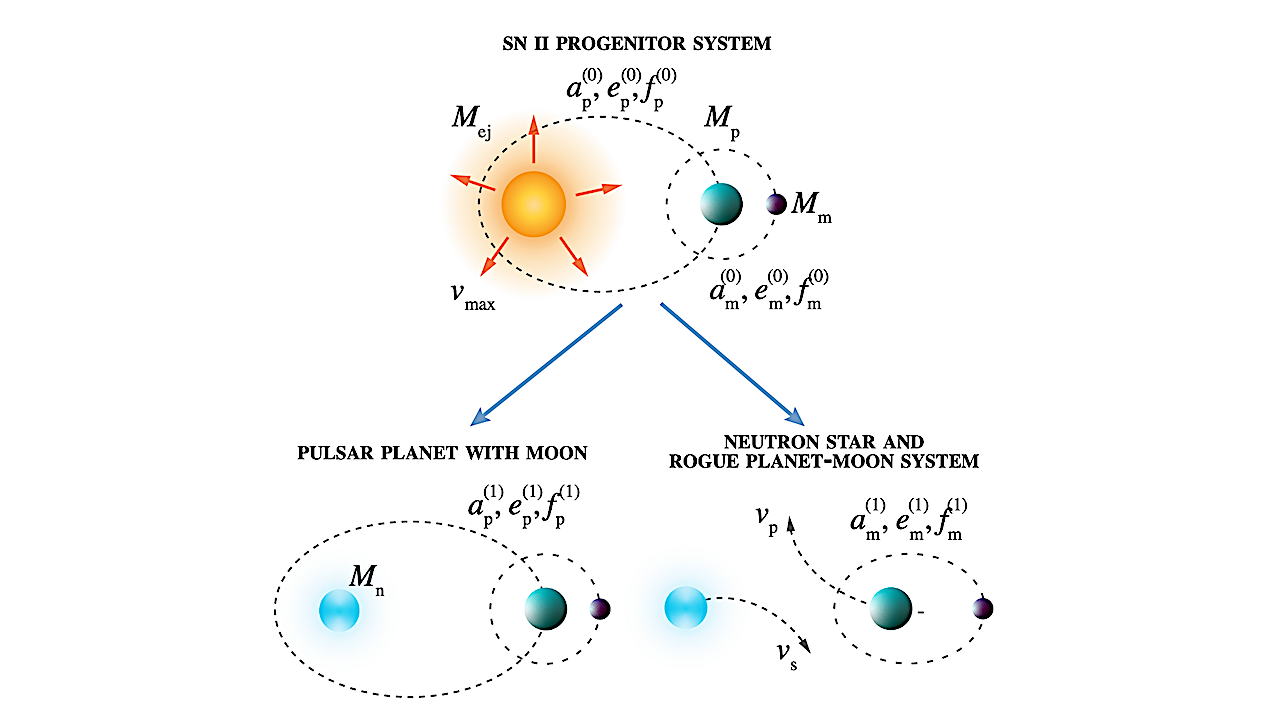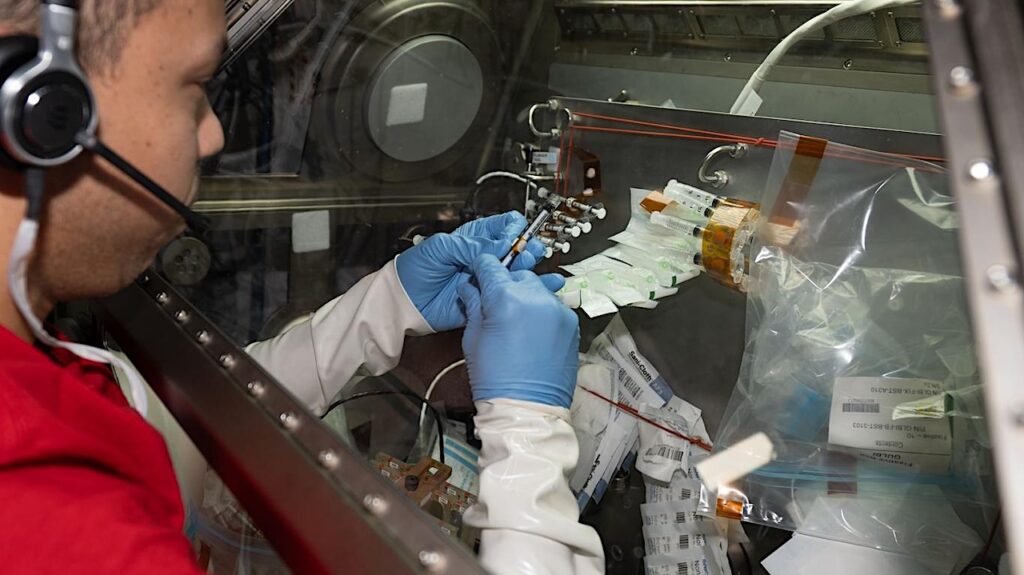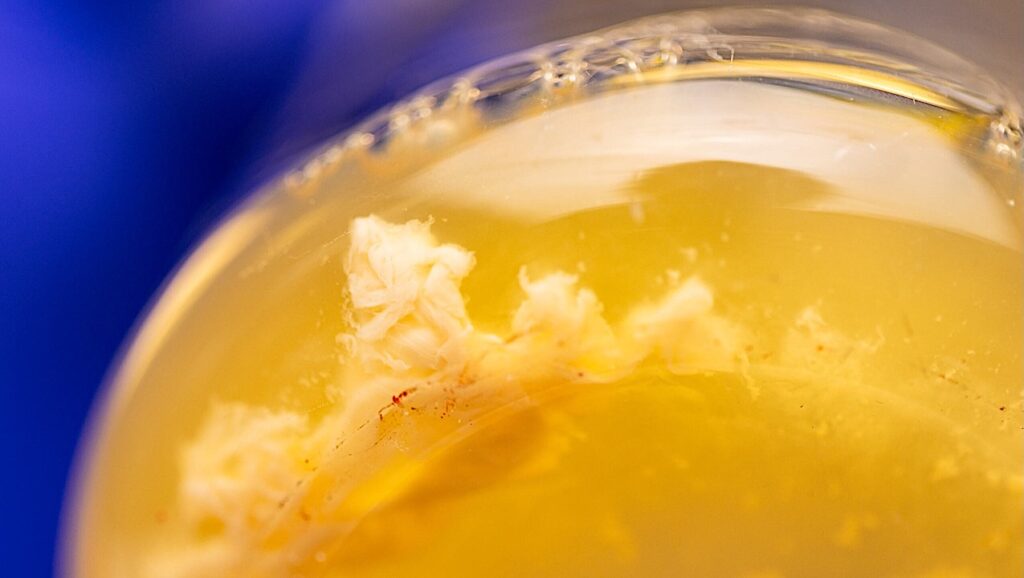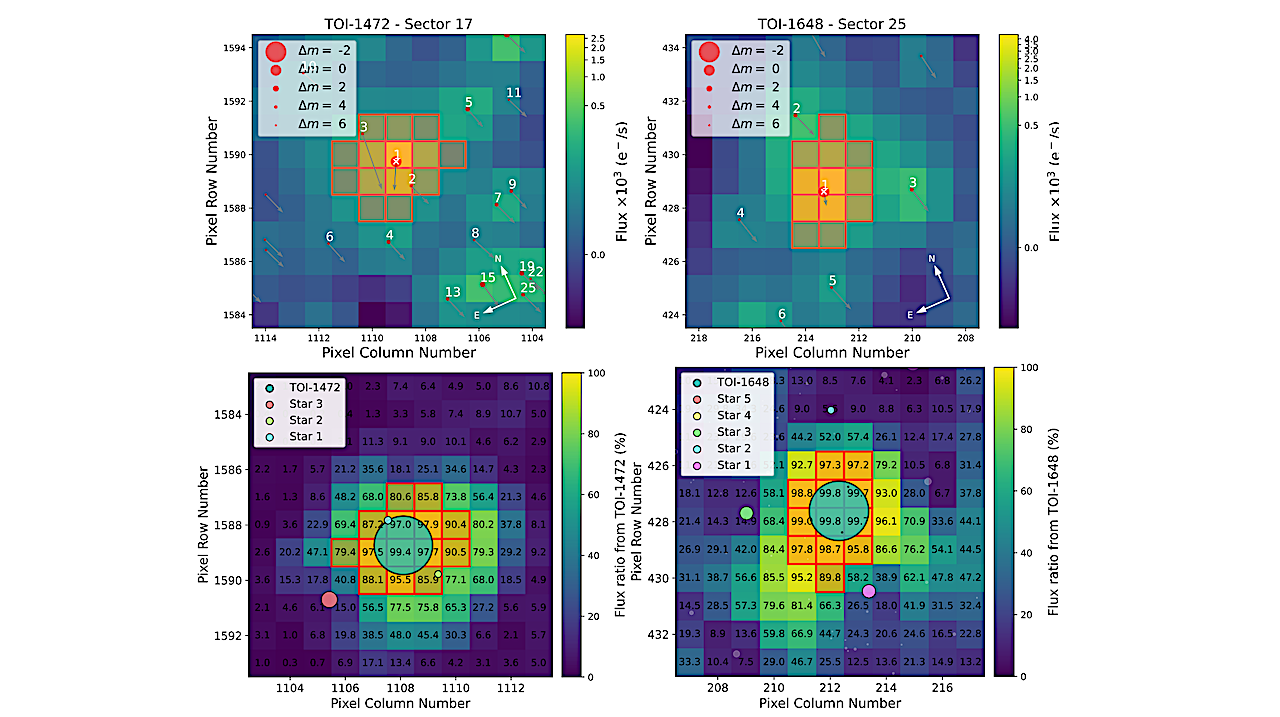Now Reading: Life In The Dark: Potential Urability Of Moons Of Rogue Planets
-
01
Life In The Dark: Potential Urability Of Moons Of Rogue Planets
Life In The Dark: Potential Urability Of Moons Of Rogue Planets


The visual representation of the parameters used for modelling the SN II explosion. The progenitor system (top) can evolve into two distinct end states (bottom): the planet-moon system can stay bound to the neutron star or can leave the remnant and travel as a rogue system. The moons stay bound to the planet in both scenarios. — astro-ph.EP
Free-floating (rogue) planets are thought to be numerous in the Galaxy and may retain their moons after ejection from their natal systems. If those satellites acquire or preserve orbital eccentricity, tidal dissipation could provide a long-lasting internal heat source, potentially creating urable* environments (capable of enabling abiogenesis) in the absence of stellar radiation.
Aims. We explore (i) whether moons remain dynamically bound to planets expelled by a core-collapse (Type II) supernova, (ii) how the explosion reshapes their orbits, and (iii) under which circumstances tidal heating can sustain urable subsurface oceans that meet the minimal conditions for life to originate.
Methods. We carried out 4,412 two-dimensional N-body simulations with an 8th-order Runge–Kutta scheme, modelling homologous stellar mass loss for progenitors of 10 M⊙. Post-explosion orbital elements of single moons and resonant moon systems were analysed, and tidal heating power was estimated with a constant phase-lag prescription for several tidal dissipation functions and moon densities.
Results. All simulated moons survive the supernova and remain bound to their planets. The explosion excites moon eccentricities up to ≃ 7 × 10−4 and ≃ 3 × 10−3 for single moons of planets with circular and eccentric orbits, respectively. For resonant pairs, an eccentricity of 2 ≲ ×10−2 is preserved. The semi-major axis of the moons changes by ≲ 0.2 %. For 12−15 % of cases – preferentially moons at a ≤ 15 Rp and with e ≥ 10−3 – the specific tidal heating power lies between 0.1 and 10 times what is estimated on Europa or Enceladus, sufficient to maintain liquid oceans beneath an ice crust. Eccentricity damping timescales exceed the age of the Solar System for a ≥ 10 Rp, implying billions of years of continuous heating on the moons.
Conclusions. Moons of rogue planets ejected via Type II supernova explosions are both dynamically stable and, in a significant minority of configurations, tidally active enough to host long-lived subsurface oceans. Such worlds represent promising targets for future searches for extraterrestrial life.
*Editor’s note: “Urability” is defined here as “The concept of habitability is now widely used to describe zones in a solar system in which planets with liquid water can sustain life. Because habitability does not explicitly incorporate the origin of life, this article proposes a new word-urability-which refers to the conditions that allow life to begin. The utility of the word is tested by applying it to combinations of multiple geophysical and geochemical factors that support plausible localized zones that are conducive to the chemical reactions and molecular assembly processes required for the origin of life. The concept of urable worlds, planetary bodies that can sustain an arising of life, is considered for bodies in our own solar system and exoplanets beyond.”
Viktória Fröhlich, Zsolt Regály
Comments: 15 pages, 9 figures, accepted for publication in Astronomy & Astrophysics
Subjects: Earth and Planetary Astrophysics (astro-ph.EP); Astrophysics of Galaxies (astro-ph.GA); Solar and Stellar Astrophysics (astro-ph.SR)
Cite as: arXiv:2511.03392 [astro-ph.EP] (or arXiv:2511.03392v1 [astro-ph.EP] for this version)
https://doi.org/10.48550/arXiv.2511.03392
Focus to learn more
Submission history
From: Viktória Fröhlich
[v1] Wed, 5 Nov 2025 11:52:22 UTC (3,133 KB)
https://arxiv.org/abs/2511.03392
Astrobiology, Astrochemistry, Exoplanet,
Stay Informed With the Latest & Most Important News
Previous Post
Next Post
-
 01Two Black Holes Observed Circling Each Other for the First Time
01Two Black Holes Observed Circling Each Other for the First Time -
 02From Polymerization-Enabled Folding and Assembly to Chemical Evolution: Key Processes for Emergence of Functional Polymers in the Origin of Life
02From Polymerization-Enabled Folding and Assembly to Chemical Evolution: Key Processes for Emergence of Functional Polymers in the Origin of Life -
 03Astronomy 101: From the Sun and Moon to Wormholes and Warp Drive, Key Theories, Discoveries, and Facts about the Universe (The Adams 101 Series)
03Astronomy 101: From the Sun and Moon to Wormholes and Warp Drive, Key Theories, Discoveries, and Facts about the Universe (The Adams 101 Series) -
 04True Anomaly hires former York Space executive as chief operating officer
04True Anomaly hires former York Space executive as chief operating officer -
 05Φsat-2 begins science phase for AI Earth images
05Φsat-2 begins science phase for AI Earth images -
 06Hurricane forecasters are losing 3 key satellites ahead of peak storm season − a meteorologist explains why it matters
06Hurricane forecasters are losing 3 key satellites ahead of peak storm season − a meteorologist explains why it matters -
 07Binary star systems are complex astronomical objects − a new AI approach could pin down their properties quickly
07Binary star systems are complex astronomical objects − a new AI approach could pin down their properties quickly


















